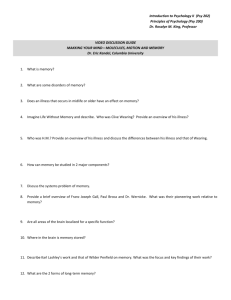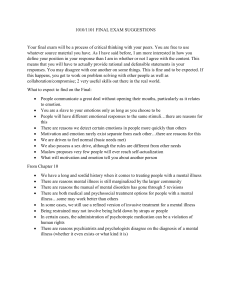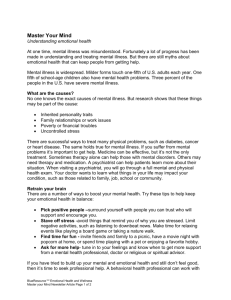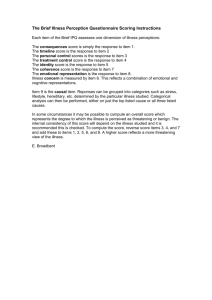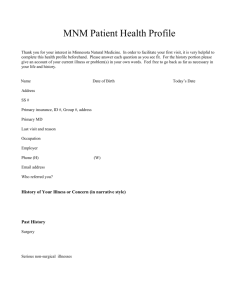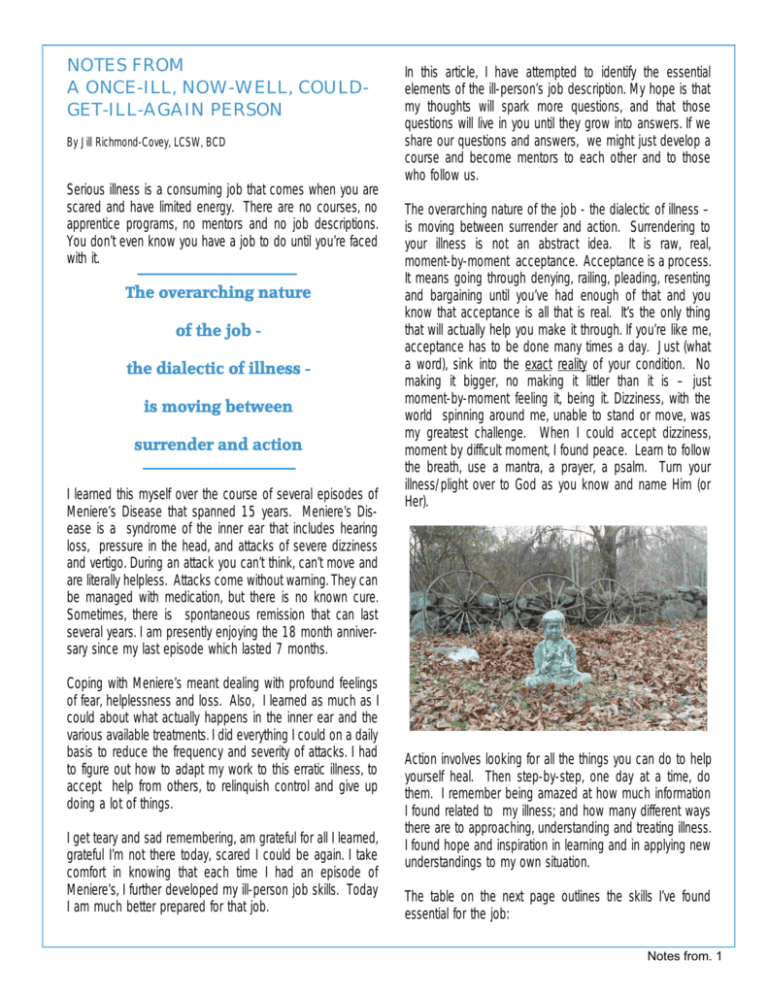
NOTES FROM
A ONCE-ILL, NOW-WELL, COULDGET-ILL-AGAIN PERSON
By Jill Richmond-Covey, LCSW, BCD
Serious illness is a consuming job that comes when you are
scared and have limited energy. There are no courses, no
apprentice programs, no mentors and no job descriptions.
You don’t even know you have a job to do until you’re faced
with it.
I learned this myself over the course of several episodes of
Meniere’s Disease that spanned 15 years. Meniere’s Disease is a syndrome of the inner ear that includes hearing
loss, pressure in the head, and attacks of severe dizziness
and vertigo. During an attack you can’t think, can’t move and
are literally helpless. Attacks come without warning. They can
be managed with medication, but there is no known cure.
Sometimes, there is spontaneous remission that can last
several years. I am presently enjoying the 18 month anniversary since my last episode which lasted 7 months.
Coping with Meniere’s meant dealing with profound feelings
of fear, helplessness and loss. Also, I learned as much as I
could about what actually happens in the inner ear and the
various available treatments. I did everything I could on a daily
basis to reduce the frequency and severity of attacks. I had
to figure out how to adapt my work to this erratic illness, to
accept help from others, to relinquish control and give up
doing a lot of things.
I get teary and sad remembering, am grateful for all I learned,
grateful I’m not there today, scared I could be again. I take
comfort in knowing that each time I had an episode of
Meniere’s, I further developed my ill-person job skills. Today
I am much better prepared for that job.
In this article, I have attempted to identify the essential
elements of the ill-person’s job description. My hope is that
my thoughts will spark more questions, and that those
questions will live in you until they grow into answers. If we
share our questions and answers, we might just develop a
course and become mentors to each other and to those
who follow us.
The overarching nature of the job - the dialectic of illness –
is moving between surrender and action. Surrendering to
your illness is not an abstract idea. It is raw, real,
moment-by-moment acceptance. Acceptance is a process.
It means going through denying, railing, pleading, resenting
and bargaining until you’ve had enough of that and you
know that acceptance is all that is real. It’s the only thing
that will actually help you make it through. If you’re like me,
acceptance has to be done many times a day. Just (what
a word), sink into the exact reality of your condition. No
making it bigger, no making it littler than it is – just
moment-by-moment feeling it, being it. Dizziness, with the
world spinning around me, unable to stand or move, was
my greatest challenge. When I could accept dizziness,
moment by difficult moment, I found peace. Learn to follow
the breath, use a mantra, a prayer, a psalm. Turn your
illness/plight over to God as you know and name Him (or
Her).
Action involves looking for all the things you can do to help
yourself heal. Then step-by-step, one day at a time, do
them. I remember being amazed at how much information
I found related to my illness; and how many different ways
there are to approaching, understanding and treating illness.
I found hope and inspiration in learning and in applying new
understandings to my own situation.
The table on the next page outlines the skills I’ve found
essential for the job:
Notes from. 1
Get stuck in denying, railing against, pleading or bargaining
Go through the moment-by-moment process of acceptance
of your illness.
Decide that there is nothing that can be done; or that healing
is outside your control.
Look for all the things you can do to heal and do them.
Expect your doctor to have all the answers and heal you.
Consider your doctor a consultant – a knowledgeable resource & supporter; and get your mind around the idea that
you are the primary treating agent
Get several opinions from M.D.s; explore and consider Naturopathic, Chinese & Chiropractic Medicine.
Investigate your illness via written word, & the World Wide
Web.
Investigate alternative approaches to healing, e.g Bernie
Siegel, Larry Dossey, Caroline Myss, Andrew Weil, Jon Kabot
Zinn, Barbara Brennan, Yoga, Tai Chi, Gi Gong.
Abdicate to others’ advice whether they be doctors, relatives,
friends or counselors/coaches
Squash your feelings.
Deny the soulful questions
Find people who will be a sounding board, helping you sort
through all the information possible while affirming your right
and ability to decide what’s best for you.
Make room for the tears, rage and fear. Learn how to stay
grounded while you are feeling. Express your feelings with
emotionally savvy relatives and friends. Express your feelings
through writing (try writing with your non dominant hand),
music, art, etc.
Once you’re grounded in your feelings, allow those soulful
questions to emerge, e. g. Has my life been worthwhile?
What do I regret doing or not doing? What do I still want
time for? Do I matter? Is there a God? An afterlife? What
unfinished business gnaws at me?
Find an objective and emotionally present coach, counselor,
or minister to walk with you while you answer these questions.
Notes from. 2
Isolate
Talk with emotionally savvy relatives and friends about your
thoughts & feelings.
Join a support group, email list serve or chat room (facilitated
and knowledgeable about your illness).
Do it all yourself
Come to understand that you can ask others to help you.
People generally like to help. Find others who can help with:
Meals
Doctor visits
Reading to you
Taking you for a drive
Researching on the Web
Housecleaning
Do more than you have energy for
Say no to nonessential tasks.
Ask others to fill in for you.
Follow the “shoulds”
Do exactly what you really need to do in order to take the
best care of yourself possible even if it seems extreme.
These skills help me where I live and are my touchstone when I coach people with chronic illness.
In Fellowship,
Jill Richmond-Covey
Copyright © 2003, all rights reserved. Permission is
granted to reproduce, copy or distribute “Notes From A
Once-Ill, Now-Well, Could-Get-Ill-Again Person,” as long
as this copyright notice and full information about contacting the author is attached. The author of this article
is: Jill Richmond-Covey. Contact her by email at:
jill@makelifework.com, or by phone at (860) 691-0799
Notes from. 3


